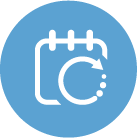Do you know your personal risk for breast cancer?
While all women are at risk of developing breast cancer, the risk is higher for some than others. Schedule an appointment at our Early Intervention Breast Clinic to learn your own personal risk and determine the optimal screening methods to keep your breast health in check.
Take The TestAbout 3D Mammography / Tomosynthesis
This simple exam uses low-dose X-rays to produce multiple images of the breast from different angles, allowing our expert physicians to view the breast in layers. With 3D mammography, or tomosynthesis, the accuracy is greater than traditional 2D mammography, offering improved cancer detection, particularly where more aggressive and invasive cancers are concerned.

A 3D mammogram uses a very low dosage of radiation. The amount is comparable to that of a short airline flight.

Experts recommend all women begin annual screening mammograms at age 40 — even those with no family history.

One in eight women will be affected by breast cancer.
You have questions. We have answers.
Below you'll find answers to some of the questions we are commonly asked by patients. Please contact our ARA Cares Coordinator at (828) 436-5500 with any additional questions or concerns.
Experts agree that beginning breast screening at age 40 saves the most lives; however, women who have an increased risk of developing breast cancer should begin them earlier. Understanding your personal risk for developing breast cancer can empower you to make informed decisions about your own breast health. ARA Health's subspecialized breast radiologists, along with the American College of Radiology and Society of Breast Imaging, recommend:
Age 30: All women should undergo a breast cancer risk assessment (especially Black women and those of Ashkenazi Jewish decent).
Age 40: All women should have a 3D screening mammogram and plan to repeat them every 12 months (not just every calendar year).
This exam is simple and quick and requires little preparation. It is helpful to wear a two-piece outfit so that just your top may be removed. Please do not wear lotion or deodorant, as these products may damage our equipment.
In most cases, the entire exam takes just 20 to 30 minutes. A female technologist will explain the procedure before it starts. You will undress from the waist up, putting on a gown that opens in the front. During the exam, the technologist will position each breast in the scanner. Your breasts will be compressed, or flattened, which may be uncomfortable, but not painful. Compression is essential to producing clear images of the breast's tissue at a lower X-ray dose, and each compression lasts less than a minute.
Screening mammography results will be sent to you within a week or two. These results will be shared with the primary physician on file as well.
- Mammograms can reveal changes in the breast up to 2 years before a patient or physician can feel them.
- Annual screening mammography finds cancer in an earlier stage, providing a more favorable outcome and allowing for more affordable and less aggressive treatment options.
- Screening mammography has helped reduce the mortality rate in the US by nearly 30% since 1990.
- The amount of radiation received during a mammogram is about what you'd be exposed to during cross-country flight.
- 3D mammography (tomosynthesis) has reduced call-back rates in women with dense breast tissue by 35%.
- 75-85% of women diagnosed with breast cancer have no family history.
- One in eight women will be impacted by breast cancer in her lifetime.
- When caught early, the five-year survival rate of breast cancer is 99%.
- Breast cancers found in women under age 50 often are more aggressive, making screening mammography an important health tool for women in their 40s.
- The cancer incidence rate increases with age, making annual mammography even more important to women ages 50+.
- Men can also get breast cancer, although it is much less common than it is for women.
All women are at risk for developing breast cancer. The two biggest risk factors are being female and getting older. Other factors that increase a person's risk include:
- being overweight or obese
- having a sedentary lifestyle
- drinking more than one alcoholic drink a day
- exposure to high-dose radiation, particularly before age 30 (e.g. radiation therapy)
- family history of breast cancer
- inherited genetic mutations
- using hormone therapy after menopause
Several factors can decrease a person's risk of breast cancer, including:
- maintaining a healthy weight
- exercising regularly, on average 3-4 hours a week
- one or more full-term pregnancies
- first full-term pregnancy before age 25
- breastfeeding for more than 15 months (total months across all children)
- menopause before age 50
Breast density measures the amount of fatty, glandular, and fibrous tissue in the breast. Dense breasts have more glandular and fibrous tissue than fat, and the only way to determine this is through a mammogram. Radiologists use a scale approved by the American College of Radiology. Women who have breast density of level A or B have more fatty tissue, while women with breast density of level C or D have more glandular and fibrous tissue, which means they have dense breasts. Dense tissue makes breast cancer more difficult to detect on a mammogram and is also a risk factor for developing breast cancer. Approximately 40% of women over age 40 have dense breast tissue. Women who have been identified as having category C or D density on a mammogram may sit down with our clinical specialist at our Breast Cancer Risk Assessment Clinic to discuss in detail what this means and how to best address it with a supplemental screening plan.
Screening mammograms are used for women who have no symptoms of breast disease. They do not require a physician’s referral and are usually covered by insurance at 100%. Diagnostic mammograms do require a physician’s referral, and costs are applied to a patient's insurance deductible. Diagnostic mammograms are used for specific reasons:
- If radiologists have concerns about a particular area on a screening mammogram, a diagnostic mammogram can be ordered to further evaluate.
- If a patient has a new breast concern, like a lump, nipple discharge, or changes in the breast skin, referring physicians will order a diagnostic mammogram.
- If a patient has previously been diagnosed with breast cancer, she may receive diagnostic mammograms for several years post-treatment.
There is power in education!
These short, patient-friendly videos were created by radiologist experts at the American College of Radiology (ACR) to arm you with the knowledge you need to take an active role in your own breast health. Watch and learn!
HI, NEIGHBOR!
ARA Health Specialists is the largest and most advanced radiology practice in the region, providing a broad range of specialties to hospitals, clinics, and imaging centers throughout western North Carolina. We're proud to offer comprehensive breast services at multiple locations. Schedule your annual screening mammogram today!
Schedule a consultation today.
It's quick and easy. Our ARA Coordinators are here to assist yo with all of your needs, starting with making an appointment. Reach out today. ARA cares, and we're here to help.
Schedule Now



